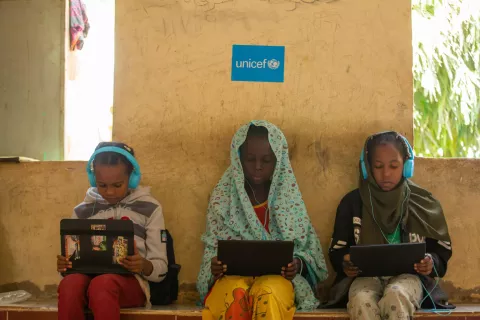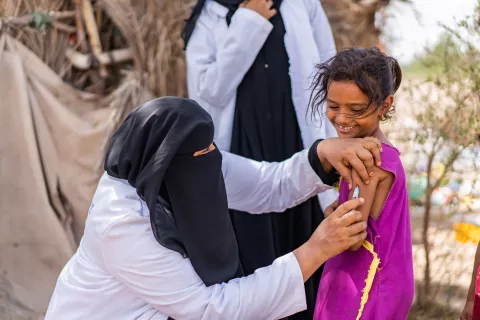Falling through the cracks: Yemen’s forgotten children in a cholera crisis
In the ongoing cholera outbreak which has gripped Yemen since late April, children are the most vulnerable

The ongoing cholera outbreak which has gripped Yemen since late April is another example of the dangers associated with a collapsing health system. To date, there have been over 175,000 suspected cases and more than 1,000 deaths. Children are the most vulnerable. With low immunity, poor nutritional intake and unsanitary living conditions, these children are sitting on the cusp of infection and disease. The collapsing health system – where doctors haven’t been paid and basic medical supplies are in extreme shortage – is making matters worse.
SANA'A, Yemen, 23 June 2017 – Worried parents wait outside the cramped paediatric emergency ward in Ma’abar hospital, 100 kilometers south of Sana’a, the capital of Yemen. Helpless and unsure how to save their suffering children, they look expectantly at the few doctors and nurses on duty who hurriedly move in and out of the ward, wearing scrubs and masks.
A narrow aisle leads to the neonatal ward, where infants lie in incubators. Some were prematurely delivered while others suffer from medical complications. These children are lucky to receive treatment. There are only ten functional incubators in the entire district.
At the entrance of the ward, we see a parent arguing with the paediatrician. Exhausted and unable to cope with the recurring cost of treatment for Reem, his four-month-old daughter who suffers from a respiratory disorder, Akram Alnageel, wants to take his daughter back to his village. Reem has been in the incubator for the past 25 days. But this is not the first time she is in hospital. She has come three times since she was born. Reem’s fragile and weak body is suffering, and if not properly treated, she will develop pneumonia. The doctors fear that if she is discharged, the long journey home may be too much for her to handle.
“I am tired, Reem’s mother is tired and we cannot afford the cost,” says Akram. “We accept whatever is destined. We accept death,” his shoulders drop and he looks away as if resigning to whatever fate has in store for him and his daughter.

A baby sleeps in an incubator at the Ma’abar hospital in Yemen. Across the country, UNICEF provides life-saving health and nutrition assistance reaching the most vulnerable children, mothers and families. UNICEF supports health facilities, mobile teams, outreach campaigns and community volunteers in hard-to-reach locations.
The paediatrician trying to convince Akram to stay is Dr. Ghaylan AbuGhanem. “There are many parents like Akram who are forced to take their seriously ill children out of the hospital because they cannot afford the cost of the medicine or simply because the cost of transportation to and from the hospital is very high,” he says. “I deal with such parents every single day. I’ve had to discharge children knowing that they will not make it back to their homes. I try to convince them but I cannot force them.”
Reem is lucky. Dr. Ghaylan has succeeded in convincing Akram to let his daughter remain under medical care, at least for now.
According to Dr. Ghaylan, the mortality rate among children in Ma’aber district is high. He estimates that two out of every ten infants that are admitted in the hospital die. The doctor explains that the hospital is far from many districts and parents only bring their children when the child’s situation is already complicated, and often when it’s too late.
The situation is the same across all governorates of Yemen. With over 50 per cent of health facilities not fully functional due to the conflict, the health system is hanging by a thread. The health facilities that do function, such as this hospital, are overwhelmed and cannot accommodate the increasing numbers of patients. To make matters worse, doctors have not been paid their salaries for many months. Dr. Ghalyan tells us that many doctors have left the hospital and either joined private hospitals or clinics in neighbouring cities, or left the country in search of a better living. Some of his acquaintances have lost their lives on the roads out of Yemen.
In Sana’a, Al-Thawrah is a leading referral hospital. People from across the country come here, desperate to receive treatment and equally desperate for their loved ones to make it out alive. But this hospital faces the same challenges.
“I feel that I am participating in the death of patients every time I admit them. How do I treat them? I have no medicines, no supplies and no staff. Even the equipment is not working and needs repair,” says Dr. Eman Alsheree, a gynaecologist at the hospital. “We only accept very serious complications where pregnant women or mothers are on the verge of death. I have seen women deliver children on the road, in a car or on the streets. There is no way I can provide them with treatment.”

After years of conflict, Yemen's public health system is hanging by a thread. UNICEF is supporting hospitals and health facilities by procuring essential drugs and vaccines, and covering basic operations costs such as electricity and fuel.
At the paediatric emergency room, children are sprawled across an un-sanitized open hall. Their attendants huddle by their sides. Children admitted here suffer from all sorts of illnesses, most of them are severe. We see a mother running to other families in the room, begging for money. Her son is in a critical stage and the doctors have asked for a specific medicine. The medicine is only available at one pharmacy, at a price she cannot afford.
The stories are countless, the suffering is unparalleled. Whether it is children dying of preventable diseases or pregnant women dying at the gates of hospitals. Yemen is suffering the worst humanitarian disaster in its modern history. Its children, the most vulnerable of the population, are the biggest victims. They are paying the cost for a conflict not of their making.
In 2015, over 10,000 children died from preventable diseases because of the crumbling health system. UNICEF estimates similar figures for the following years. Those who do survive are prone to malnutrition as the country is staring at a famine.
There is a shortage of safe water and medical supplies in the country, exacerbating the ongoing outbreak of cholera and acute watery diahrroea. Currently, more than 24 million people are at risk. UNICEF is working with health, WASH, and communication for development partners to scale up the response for the next several months to control the outbreak, prevent further spread, and minimize the risk of recurrence.
Back at the paediatric emergency room in Al-Thawrah hospital, the desperate mother who was begging for money to save her child has found a donation from an anonymous person. She now has enough money to buy her son the urgent medication needed to save his life. She is overwhelmed with relief. But there are many mothers who are not so fortunate.


